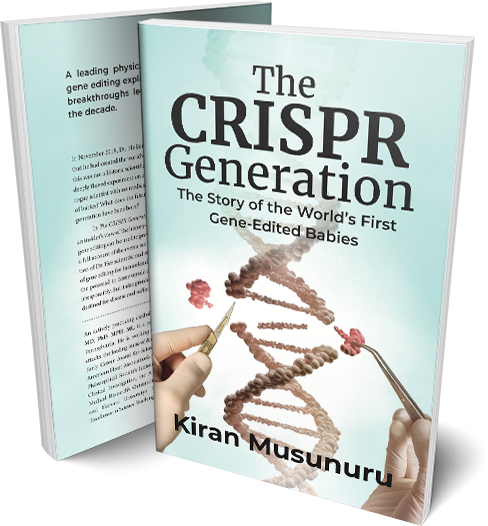
Author Kiran Musunuru
The Crispr Generation
Dr. Kiran Musunuru, a leading physician, scientist, and expert in gene editing, explains how a series of scientific breakthroughs led to the medical scandal of the decade.
In November 2018, Dr. He Jiankui of Shenzhen, China, announced via YouTube that he had created the world’s first gene-edited babies. It soon became clear that this was not a historic scientific achievement, but rather a historic ethical fiasco, a deeply flawed experiment on unborn human beings. What made it possible for a rogue scientist with no medical training to covertly and recklessly alter the genes of babies? What does the future hold now that the first members of the CRISPR generation have been born?
Learn More

Expertise
Cardiologist
Geneticist
Gene Editor
An actively practicing cardiologist and committed teacher, Kiran Musunuru, MD, PhD, MPH, ML, is a professor and genetics researcher at University of Pennsylvania. He is working to create a one-shot “vaccination” against heart attacks, the leading cause of death worldwide. He is a recipient of the Presidential Early Career Award for Scientists and Engineers from the White House, the American Heart Association’s Award of Meritorious Achievement, the American Philosophical Society’s Judson Daland Prize for Outstanding Achievement in Clinical Investigation, the American Federation for Medical Research’s Outstanding Investigator Award, and Harvard University’s Fannie Cox Prize for Excellence in Science Teaching.
Research focus
Developing a “vaccination” against heart attack.
Cardiovascular disease is the leading cause of death worldwide, not just in the U.S. but even in the poorest countries in the world. It has already become the next big global health threat. Dr. Musunuru is using a new technology called “gene editing” to modify genes in the liver so as to permanently reduce a person’s cholesterol levels and protect against heart attack and stroke—with a single shot whose effects would last for the lifetime (instead of having to take pills every day). The treatment has been shown to work extremely well in mice, and now he is working to make the treatment as effective and safe as possible before testing it in people who are at extremely high risk for suffering a heart attack. If it works well, it could be offered to the general population as a “vaccination.”
Discovering new heart attack genes.
Dr. Musunuru has been studying people with naturally born low cholesterol levels in order to figure out whether there are genetic causes. He discovered that there are people with rare “good” mutations in a gene called ANGPTL3 that not only reduce both cholesterol and fat levels in the blood but also substantially protect against heart attack and, to a lesser degree, against type 2 diabetes. At the same time, these people who have won the “genetic lottery”, so to speak, do not suffer any bad effects from the “good” mutations. This work recommends ANGPTL3 as a target against which to develop new therapies, which is in progress.
Determining what your genes mean for your heart health.
More and more people are having their genes sequenced, and it turns out that everybody has dozens of mutations that are unique to them. Fortunately, most of the mutations are benign and do not affect one’s health, but it is possible that one or more of the mutations increases the risk of a serious disease. Dr. Musunuru would like to be able to determine whether a person’s mutations signify risk of heart disease before the person develops the disease, so as to give preventive therapy early. He is using adult stem cells into which he inserts patient mutations, turns them into heart muscle cells in a dish, and then studies the properties of the muscle cells to determine whether there are signs of disease caused by the mutations. This is letting him sort out whether a particular mutation is benign or makes a person vulnerable to heart disease, long before the disease occurs.
My research laboratory focuses on:
- the discovery of novel genetic variants associated with disease and its risk factors;
- understanding how these genetic variants influence gene function;
- characterizing the implicated genes and their effects on disease phenotypes; and
- using these insights to initiate the development of novel therapeutics.
A key element of my research program is to use human model systems and humanized model systems—e.g., genetically modified human embryonic stem cells and induced pluripotent stem cells and tissue types differentiated from these cells, mice in which organs such as the liver or portions of the mouse genome have been replaced with the human equivalents—to study human genetic variation.
Selected Publications
- Musunuru K, Kathiresan S. Genetics of common, complex coronary artery disease. Cell. 2019;177:132-145.
- Lv W, Qiao L, Petrenko N, Li W, Owens AT, McDermott-Roe C, Musunuru K. Functional annotation of TNNT2 variants of uncertain significance with genome-edited cardiomyocytes. Circulation. 2018;138:2852-2854.
- Rossidis AC, Stratigis JD, Chadwick AC, …, Morrisey EE, Musunuru K, Peranteau WH. In utero CRISPR-mediated therapeutic editing of metabolic genes. Nat Med. 2018;24:1513-1518.
- Chadwick AC, Evitt NH, Lv W, Musunuru K. Reduced blood lipid levels with in vivo CRISPR-Cas9 base editing of ANGPTL3. Circulation. 2018;137:975-977.
- Liu DJ, Peloso GM, Yu H, …, Musunuru K, Willer CJ, Kathiresan S. Exome-wide association study of plasma lipids in >300,000 individuals. Nat Genet. 2017;49:1758-1766.
- Stitziel NO, Khera AV, Wang X, …, Saleheen D, Musunuru K, Kathiresan S. ANGPTL3 deficiency and protection against coronary artery disease. J Am Coll Cardiol. 2017;69:2054-2063.